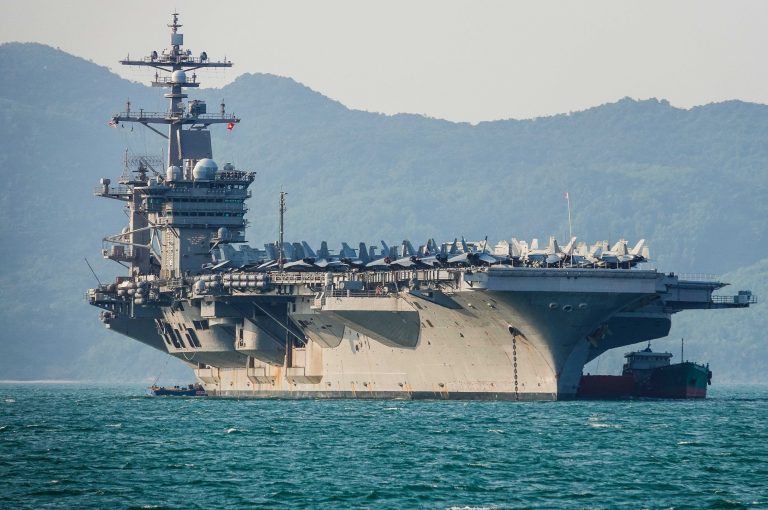The Nimitz-class aircraft carrier USS Carl Vinson departed from San Diego last month. It has recently entered the South China Sea. Carrying F-35C stealth fighters, the aircraft carrier is participating in maritime strike exercises, flight operations with fixed and rotary-wing aircraft, and coordinated tactical training air and surface units.
South China Sea operations are part of the American Navy’s routine presence in the Indo-Pacific region. The U.S. aircraft carrier has been broadcasting its position, something which many experts say is unusual. It’s believed it is showing that it is moving freely in waters that Beijing claims as its own.
In an interview with Radio Free Asia, Rear Adm. Dan Martin, commander of the Carl Vinson Strike Group, said that their operations in the region indicate American willingness to defend its interests as well as uphold the freedoms outlined in international laws.
According to international law, only waters within 12 nautical miles of a nation’s territory are considered its own territorial waters. However, communist China has built several artificial islands in the South China Sea to expand territorial claims. The strategy has attracted strong protests from other nations in the region.
“Any coastal state law or regulation must not infringe upon navigation and overflight rights enjoyed by all nations under international law… Unlawful and sweeping maritime claims including in the South China Sea pose a significant threat to the freedoms of the seas, including freedom of navigation, overflight, and lawful commerce… We’re not going to be coerced or forced to cede the international norms,” Martin said.
Success
You are now signed up for our newsletter
Success
Check your email to complete sign up
The CCP-backed Global Times called USS Carl Vinson’s presence in the South China Sea a “provocative deployment.” It accused the aircraft carriers of coming “straight” to the South China Sea with the aim of “deterring” Beijing.
Fu Qianshao, a Chinese military expert, told the media outlet that Beijing is fully confident in dealing with such actions. He said the PLA “cannot be defeated within the second island chain.” Following USS Carl Vinson, Washington also deployed the guided-missile destroyer USS Benfold near Meiji Reef in the South China Sea.
Martin stated that all their interactions with the Chinese Navy have been “professional and safe.” They haven’t seen any “aggressive maneuvering” from the Chinese side that would trigger concerns.
“Another busy day in @7thFleet, we trained alongside and bolstered #AlliancesandPartnerships and operated on the high seas near PLAN ships, aircraft, and submarines. Our presence in the region contributes to the security and stability for a #FreeandOpenIndoPacific,” the official account of USS Carl Vinson tweeted on Sept. 12.
While USS Carl Vinson passed through the southern point of the South China Sea, it came close within 50 nautical miles from Haiyang Dizhi 10, a fleet of Chinese survey vessels that conduct research in the region. Dizhi was operating within 200 nautical miles from Indonesia’s exclusive economic zone.
New maritime rule, Taiwan issue
The U.S. Navy’s deployment in the South China Sea comes as Beijing recently implemented a new maritime law on Sept. 1. It requires foreign vessels to report to Chinese authorities if they enter areas that Beijing claims to be their territory. The foreign vessels are expected to supply information regarding the estimated time of arrival and departure and current details on the position, for example.
In an interview with The Epoch Times, Su Tzu-yun, a Taiwan-based expert, said that the new rule could heighten tension in disputed regions like the South China Sea.
“Beijing will also apply the Maritime Traffic Safety Law to the artificial islands after September 1. So when [vessels of] other countries sailed within 12 miles of Chinese-claimed artificial reefs … a clash may break out,” Su said.
Beijing’s claims to the contested waters largely rest on its own narratives rather than any international recognition. Most countries in the region, such as Vietnam, the Philippines, Taiwan, and Japan, have never recognized the communist regime’s claims.
On Sept. 1, Pentagon spokesperson John Supple criticized Beijing’s new maritime law. “The United States remains firm that any coastal state law or regulation must not infringe upon navigation and overflight rights enjoyed by all nations under international law… [China’s] unlawful and sweeping maritime claims … pose a serious threat to the freedom of the seas,” Supple said.
Ned Price, a spokesperson at the U.S. State Department, said that Washington follows a “universal set of rules” for all nations, whether they be large or small with regards to maritime activities. He said China’s claims in the South China Sea are “unlawful” and “excessive.”
America’s increasing presence in the Indo-Pacific also puts Beijing on the defensive regarding Taiwan. Chinese officials have made it clear that they would resort to military violence to annex the island nation if needed. According to Lee Cheng-hsiu, a military expert at the National Policy Foundation of Taiwan, U.S. naval activities in the Indo Pacific act as a deterrent to such developments.
In an interview with The Epoch Times, Lee said that the CCP believes Chinese people will never rise against the regime as long as the economy keeps performing well. A war with Taiwan, especially one that has the support of the American military, is a threat to the stability of CCP rule.
“If a war against the U.S. breaks out, the CCP will worry that if it loses the war, the leader must step down and the regime will fall apart. That’s why the CCP uses the so-called intimidation and military exercises to confront and compete with the U.S., but it will not really attack Taiwan,” Lee said.







